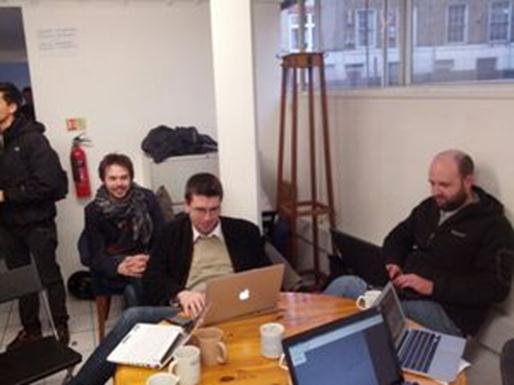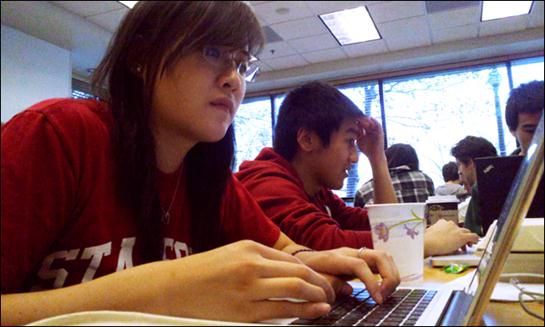I am developing ideas for my 15-minute presentation at #rds2013 http://cdrs.columbia.edu/cdrsmain/2013/01/esearch-data-symposium-february-27-2013/ . I spent yesterday at a wonderful hackathon run by OKF (Ross Mounce and Rufus Pollock) as part of the worldwide OpenDataDay. http://okfn.org/events/open-data-day-2013/

(Hacking for Health, photo: Ross Mounce)
http://opendataday.org/ asks “Who is the event for?” and answers:
EVERYONE
If you have an idea for using open data, want to find an interesting project to contribute towards, learn about how to visualize or analyze data or simply want to see what’s happening, then definitely come participate! No matter your skillset or interests, we are encouraging organizers to foster opportunities for you to learn and help the global open data community grow.

Developers
We need computer cowboys and cowgirls like yourself to wrangle data into something useful. That means visualization, notification, integration, etc., all in the name of doing something crazy and fantastic.

Designers
We need people like you to make the everything look amazing, feel intuitive, and have a smooth user experience. The best application in the world that no one can use… isn’t much use! You know the drill.

Librarians
I heard you folks like books and eat catalogs of data for breakfast. You beautiful people are going to scour the earth for interesting data, help the rest of us figure out what’s important, and generally be useful.

Statisticians
YES! YOU ARE SO NEEDED. Seriously. While we can find it, blow it up, calculate it, and make it look pretty, we needs us some mean number crunchin’ to present meaningful visualizations. Join up.

Citizens
We need you the most. If it weren’t for you, this whole thing wouldn’t be happening. We need ideas, cheerleaders, and friends t
It was worldwide. Countries, cities.. We were collecting data on budgets, transport everything. Here’s Palo Alto: http://data.cityofpaloalto.org/

The City of Palo Alto teams with Stanford University to complete the City’s first hack-a-thon. The challenge, build an application in twenty-four hours to utilize geographical information system data provided by the City.
So I’ve come up with a vision for managing research data.
We should create a Global Knowledge Commons
From that everything that I’m suggesting follows. Obviously there are pieces of our world and practice that should not be global. We’ve been discussing this on the OKF Open science list and I have changed my views as a result of this discussion. John Wilbanks (http://lists.okfn.org/pipermail/open-science/2013-February/002197.html ) makes it clear that we have a difficult balance between privacy and availability of information. He argues that we could start from a default of openness
… the privacy element is a poor reason to argue against open data, and arguing the risks of secrecy as a counterargument is an elegant formation that I think we should embrace…
There is data that is difficult to manage – some is technical (size, complexity, semantics, provenance) and some carries societal and other problems. These add an order of magnitude greater effort.
But much data – probably the majority – can and should belong to the world. Reductionist bioscience, astronomy, crystallography have already made this commitment to a Global Knowledge Commons. So have Wikipedia and Open Streetmap. These communities have created a vision and the practice and tools have followed naturally. It’s happened in software, with Open examples such as Sourceforge, StackOverflow, Bitbucket, and many others created by the community. The community creates what the community wants, needs and values.
My assertion, therefore, is that a Global Commons will drive what we need. It will allow the innovation and the diversity that iterates towards common practice. “Managing Research data” is then just part of creating the common.
But academia, where most of the research funding goes, is behind the rest of the world in modern thinking. It was noticeable that at the Open Data Day with 40 participants there was no one from academia. Health, finance, government, transport, etc – committed and excited.
Academia needs to get out into the real world and invite the real world in. If not, it will not learn how to manage its data (OUR data) in a modern manner.
*title strengthened after Glyn Moody’s tweet!
Pingback: Unilever Centre for Molecular Informatics, Cambridge - #rds2013 Managing Research Data « petermr's blog